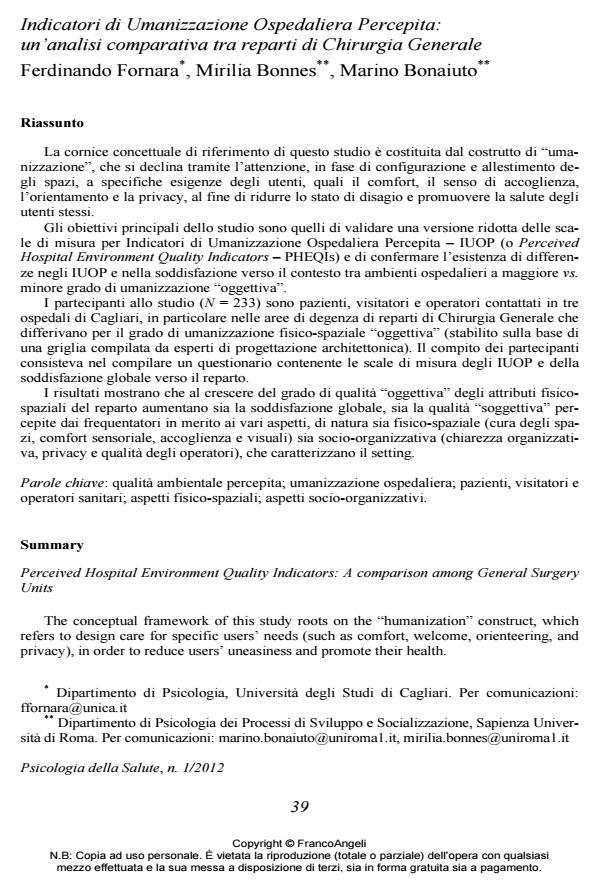Perceived Hospital Environment Quality Indicators: A comparison among General Surgery Units
Journal title PSICOLOGIA DELLA SALUTE
Author/s Ferdinando Fornara, Mirilia Bonnes, Marino Bonaiuto
Publishing Year 2012 Issue 2012/1
Language Italian Pages 22 P. 39-60 File size 424 KB
DOI 10.3280/PDS2012-001004
DOI is like a bar code for intellectual property: to have more infomation
click here
Below, you can see the article first page
If you want to buy this article in PDF format, you can do it, following the instructions to buy download credits

FrancoAngeli is member of Publishers International Linking Association, Inc (PILA), a not-for-profit association which run the CrossRef service enabling links to and from online scholarly content.
Perceived Hospital Environment Quality Indicators: A comparison among General Surgery Units The conceptual framework of this study roots on the "humanization" construct, which refers to design care for specific users’ needs (such as comfort, welcome, orienteering, and privacy), in order to reduce users’ uneasiness and promote their health The main goals of the study concern the validation of a short version of the scales measuring the Perceived Hospital Environment Quality Indicators (PHEQIs) (labeled in Italian "Indicatori di Umanizzazione Ospedaliera Percepita" - IUOP), and the confirmation of differences between high- vs. low-humanized hospital environments in PHEQIs and satisfaction. Study participants (N = 233) were inpatients, visitors and staff of three General Surgery Units (included in different hospitals of Cagliari), which differed for their degree of "objective" spatial-physical humanization (rated by design experts who filled in a checklist). Hospital users filled in a questionnaire including the scales measuring the PHEQIs and the global satisfaction toward the hospital unit. Results show that the better the "objective" quality of the setting, the higher are both users’ global satisfaction toward the hospital experience and perceived quality of spatialphysical (i.e., care for the spatial aspects, sensorial comfort, welcome, and views) and social- organizational (i.e., organizational clarity, privacy, and staff qualities) features.
Keywords: Perceived environmental quality; hospital humanization; patients, visitors, and staff; spatial-physical features; social-organizational features.
- Promoting the work engagement of the health worker: The role of secure workplace attachment, perceived spatial-physical comfort, and relationship with patients Alessandro Lorenzo Mura, Marcello Nonnis, Fabrizio Scrima, Ferdinando Fornara, in Journal of Environmental Psychology 101937/2023 pp.101937
DOI: 10.1016/j.jenvp.2022.101937 - Changing the “Meaning of Place” Within a Hospital: The Impact of Establishing an Art Gallery on Esthetic Experience, Restorativeness, Affective Commitment, and Work Engagement of Healthcare Personnel Fabrizio Scrima, Marcello Nonnis, Alessandro Lorenzo Mura, Elena Foddai, Liliane Rioux, Ferdinando Fornara, in Environment and Behavior /2023 pp.735
DOI: 10.1177/00139165241270613 - Perceived Environmental Quality Indicators as Health-Enabling Elements Within Prisons Susana Alves, Cristina Cabras, Diego Bellini, Marino Bonaiuto, in The Prison Journal /2024 pp.215
DOI: 10.1177/00328855231222443 - Exploring the Role of Birth Environment on Italian Mothers’ Emotional Experience during Childbirth Laura Migliorini, Nicoletta Setola, Eletta Naldi, Maria Chiara Rompianesi, Laura Iannuzzi, Paola Cardinali, in International Journal of Environmental Research and Public Health /2023 pp.6529
DOI: 10.3390/ijerph20156529 - Perceived Hospital Environment Quality Indicators: The Case of Healthcare Places for Terminal Patients Sara Manca, Marino Bonaiuto, Ferdinando Fornara, in Buildings /2022 pp.57
DOI: 10.3390/buildings13010057 - The 1st International Conference on Net-Zero Built Environment Laura Sacchetti, Roberto Di Giulio, pp.1815 (ISBN:978-3-031-69625-1)
Ferdinando Fornara, Mirilia Bonnes, Marino Bonaiuto, Indicatori di Umanizzazione Ospedaliera Percepita: un’analisi comparativa tra reparti di Chirurgia Generale in "PSICOLOGIA DELLA SALUTE" 1/2012, pp 39-60, DOI: 10.3280/PDS2012-001004